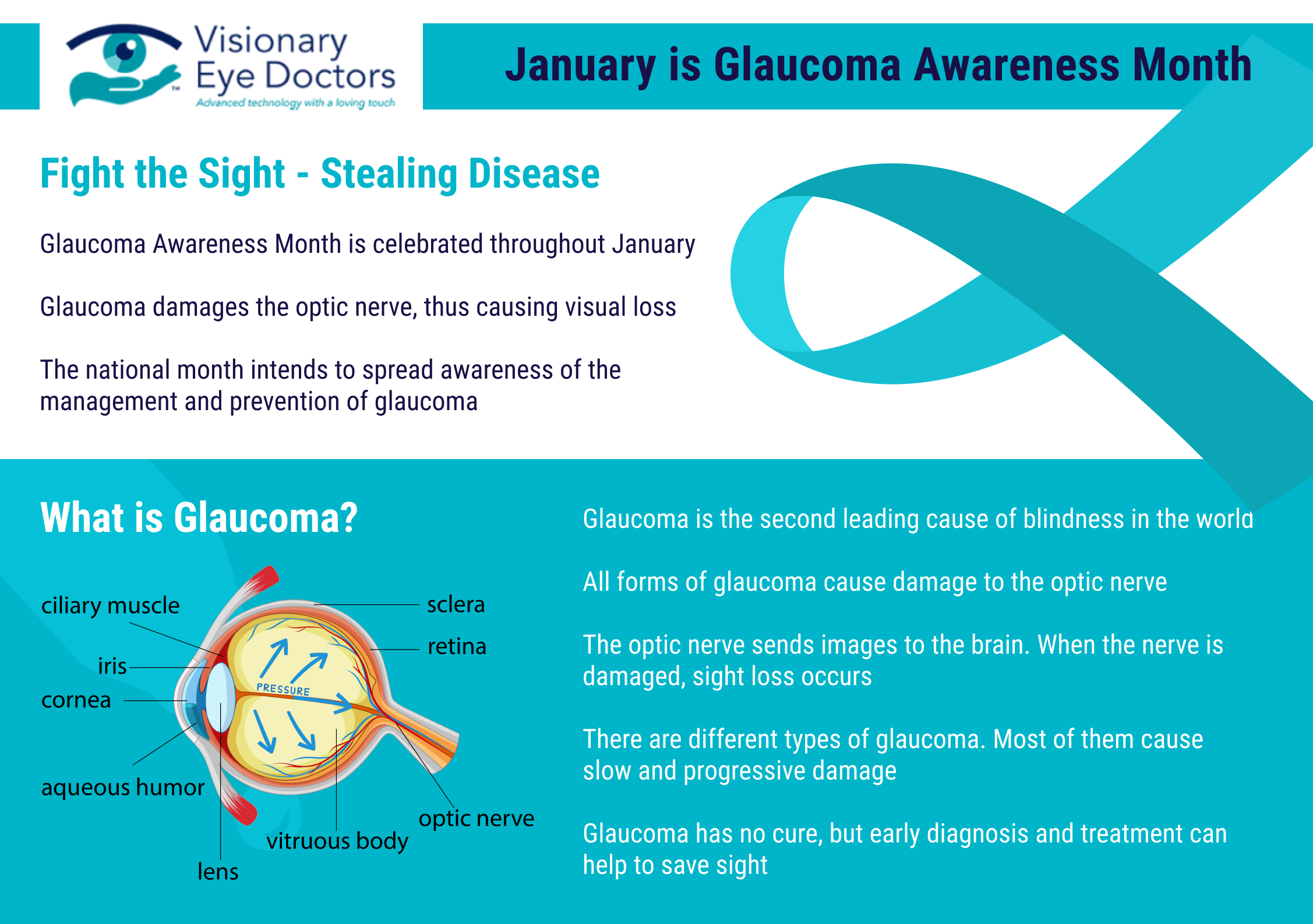Early Detection is Key with Glaucoma

January is National Glaucoma Awareness Month and the perfect time to spread information and awareness about this sight-stealing disease. More than 3 million people in the United States suffer from glaucoma, a number predicted to continue to increase significantly over the next several years. This disease is not preventable but, if left untreated, can cause as much as 40% of vision loss without any noticeable symptoms.
What are the Risk Factors for Glaucoma?
Glaucoma is acknowledged as the leading cause of irreversible blindness worldwide. Its impact, however, is unevenly distributed across different ethnic groups, with a notably higher prevalence in African American and Latino populations. Specifically, glaucoma is found to be 6 to 8 times more common in African Americans compared to Caucasians.
Other high-risk groups include people over 60, family members of those already diagnosed, diabetics, and severely nearsighted people. Regular eye exams are especially important for those at higher risk for glaucoma and may help to prevent unnecessary vision loss.
What Causes Glaucoma?

Glaucoma is often hereditary but it can also be caused by medications, prior eye surgeries, or an injury to the eye. The most common type of glaucoma is called open-angle glaucoma. The first symptoms of this condition are often patchy blind spots in your peripheral vision. In an advanced stage of this type of glaucoma, you might experience tunnel vision. A less common form of the disease called, acute angle-closure glaucoma, often has a more rapid onset. You should seek immediate medical care if you experiencing a combination of some of the following symptoms:
- Severe Headache: The rapid increase in intraocular pressure can cause intense headaches. The pain is often severe because the pressure inside the eye transmits to surrounding tissues, affecting the trigeminal nerve, which is responsible for facial sensation and motor functions such as biting and chewing.
- Eye Pain: This symptom directly results from the dramatic rise in eye pressure pressing on the optic nerve and other structures within the eye. The pain is often described as deep, throbbing, and unbearable, signaling that the eye is distressed.
- Nausea/Vomiting: These symptoms may seem unrelated to eye conditions but occur because severe eye pain and elevated pressure can trigger a vagal response. When stimulated excessively, the vagus nerve can lead to a sudden drop in heart rate and blood pressure, causing nausea and vomiting as a reflex action.
- Blurred Vision: The increased pressure inside the eye can affect the shape and clarity of the eye’s lens and cornea, distorting vision. Fluid buildup can also lead to swelling and clouding in the eye’s structures, further impairing vision.
- Haloes Around Lights: This symptom arises because the elevated eye pressure causes corneal edema, where fluid builds up in the cornea, leading to visual disturbances. Patients might notice rings or haloes around lights due to light scattering as it passes through the swollen cornea.
- Eye Redness: The eyes may appear red due to the dilated blood vessels in the sclera (the white part of the eye). The pressure increase can cause blood vessel congestion, making the eyes look bloodshot and inflamed.
With a diagnosis of glaucoma, it’s best to follow up with an ophthalmologist who specializes in glaucoma at regular intervals to determine the best course of treatment and ensure that your treatments are working effectively. All glaucoma treatments are aimed at protecting the patient from further, irreversible vision loss. Daily eye drops that help reduce eye pressure are typically the early treatment followed by laser treatment and incisional surgical procedures.
How Visionary Eye Doctors Treat Glaucoma
At Visionary Eye Doctors, we prioritize the health of your eyes through our comprehensive eye exams, which play a crucial role in the early detection of various eye diseases, including glaucoma. These exams are thorough and cover multiple aspects of eye health.
- Glaucoma Testing: As part of our routine eye exams, we include specific tests for glaucoma – a group of eye conditions that can cause blindness. This includes a simple and painless procedure to measure the intraocular pressure (IOP) of your eye, which is a key indicator of glaucoma. Elevated IOP can lead to damage to the optic nerve, which is vital for good vision.
- Optic Nerve Assessment: During the exam, your doctor will closely examine your optic nerve for any signs of damage. This is crucial as glaucoma often causes no symptoms in its early stages and can only be detected through a comprehensive eye exam. Detecting optic nerve damage early is vital for preventing irreversible vision loss.
- Field of Vision Measurement: Glaucoma can affect your peripheral (side) vision without you noticing. We conduct field of vision tests to check for any blind spots or areas of impaired vision, which might suggest the presence of glaucoma or other eye problems.
- Dilated Eye Exam: A key part of our comprehensive dilated eye exam is pupil dilation. By using special drops to widen your pupils, your eye doctor can get a better view of the inside of your eyes. This allows for a more detailed examination of the retina and optic nerve for signs of damage from diseases like glaucoma, diabetic retinopathy, and macular degeneration.
- Regular Monitoring: If any signs of glaucoma or other eye conditions are detected, we will recommend a suitable treatment plan and regular monitoring. Early detection and treatment can help control conditions like glaucoma, reducing the risk of total vision loss.
Remember, regular comprehensive eye exams are vital, even if you aren’t experiencing any vision problems. Early detection of eye conditions like glaucoma can save your sight. We recommend adults have a comprehensive dilated eye exam at least once every two years, or more frequently if recommended by their eye doctor.
 Meet Our Glaucoma Specialists
Meet Our Glaucoma Specialists
Our glaucoma specialists, Dr. Reena Garg and Dr. Georgina Medina are board-certified, fellowship-trained in both glaucoma and cataract and refractive surgery and utilize the latest in glaucoma research, treatment, and surgical options.
Schedule Your Glaucoma Screening
The significance of glaucoma screenings cannot be overstated, especially when considering the nature of glaucoma as a potentially devastating eye condition that can lead to irreversible vision loss. While it’s true that there is currently no cure for glaucoma, early detection, and timely treatment can significantly alter the course of the disease. Treatment options available today are highly effective in managing eye pressure, the primary risk factor for glaucoma, thereby slowing the disease’s progression and helping to prevent further vision loss. This proactive approach is crucial in reducing the likelihood of significant visual disability that can accrue over a patient’s lifetime.
Glaucoma often progresses silently, sometimes without noticeable symptoms until significant vision has been lost. This stealthy nature of glaucoma underscores the importance of regular screenings, especially for those at higher risk due to factors like age, family history, or underlying health conditions. Screenings are simple, non-invasive, and can be the first line of defense in safeguarding your vision.
Making a resolution to schedule a glaucoma screening with Dr. Reena Garg & Dr. Georgina Medina is a step toward prioritizing your eye health. By calling (301) 591-1763 or requesting to schedule online, you’re taking a proactive stance in preventing glaucoma’s silent threat to your vision. These screenings are an essential component of eye care, serving not just as a preventative measure but as a peace of mind for those at risk. Remember, preserving your vision starts with taking action—don’t wait until it’s too late to address the health of your eyes.

